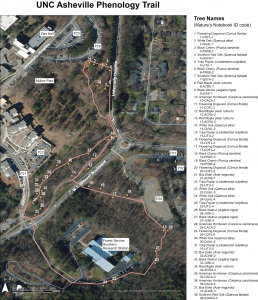The Botanical Gardens of Asheville, the Reed Creek Greenway and the French Broad River are all directly adjacent to the UNC Asheville campus. The Outdoors Program at Campus Recreation offers trips weekly throughout the year. Activities include skiing, kayaking, and rock climbing.
Student Gardens
UNC Asheville strives to provide sustainable food options for the campus community, hosting a weekly farmers market on campus during warm months and running a number of gardens on campus. The Student Environmental Center (SEC) hosts a number of garden workdays for students in three different gardens; Sol Garden, ROOTS Garden, and Castanea Forest Garden. These workdays are free and open to all students, and the SEC encourages students to come learn how to grow their own food and connect with a diverse group of people. Please contact the SEC if you’d like to work in one of the beautiful and bountiful gardens.
Outdoor Programs
The UNC Asheville community can take advantage of a number of outdoor recreation options on campus or in nearby natural areas. Some 4.5 miles of established walking trails are used daily by faculty, staff and students. One trail passes by the University’s low ropes course, located in the wooded section of South Campus. This course, donated by Diamond Brand Outdoors, provides a series of outdoor problem solving exercises that challenge a group to think creatively and work together as a team. It is used by student groups, academic classes, and athletic teams.
The UNC Asheville Campus Recreation Outdoors Program offers guided excursions for students, including rafting, caving, camping, horseback riding, snow skiing, mountain biking and rock climbing. Transportation, equipment and guides are provided for free or a small fee. For students planning their own adventures, the Outdoor Program and Bike Shop offer low-price rentals on gear ranging from mountain bikes to tents.
Campus Recreation: Outdoor Programs
Botanical Gardens
The Botanical Gardens at Asheville are maintained by a non-profit organization on a preserve just south of campus. The garden contains a complete collection of plants that are native to North Carolina. Featuring thousands of labeled plants and trees native to the Southern Appalachians, the gardens are a study center for botany students, a refuge for wildlife and a source of enjoyment for the university and community.
The Botanical Gardens were created in the fall of 1960 by various groups of women and men from several different Asheville garden clubs. The Botanical Gardens is a 10-acre garden with a walking trail that circles the garden and wooden bridges over the creeks.
There is a reconstructed dog-trot log cabin on the site just off the trail. The garden is also the site of the Battle of Asheville, which took place April 6, 1865. The garden contains a complete collection of plants that are native to North Carolina including many rare specimens like the Shortia, which is a plant found by French botanist Andre Michaux, in the mountains of western North Carolina, but was lost for almost 100 years before it was rediscovered.
You can access the Gardens from several walking trails that connect to the south side of campus.
Phenology Trail
The UNCA Phenology Trail was established in Summer 2018 as part of a collaborative research grant funded by the National Science Foundation. Phenology is the study of the timing of biological events such as spring leaf out, flowering, and onset of fall color, which are called phenophases. At UNC Asheville, we are monitoring different phenophases on nine common tree species. Data are recorded on the National Phenology Network (www.usanpn.org) using their “Nature’s Notebook” App and are available to scientists worldwide who are investigating the responses of plants to climate change. Students in several classes, including Principles of Botany and Forest Ecology, use these data in course exercises.
The trail begins in the student parking lot P26, follows the greenway along W.T. Weaver Boulevard before crossing into the urban forest around the Forest Service’s Southern Research Station. The trail crosses back to the main campus and follows Reed Creek to University Heights and back to parking lot P26. The trail is approximately one mile in length.

